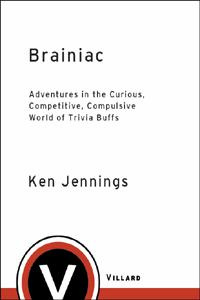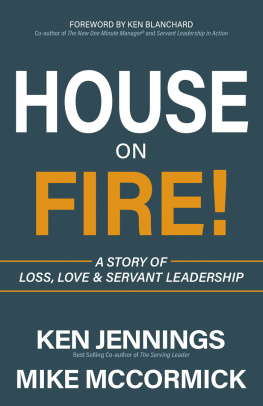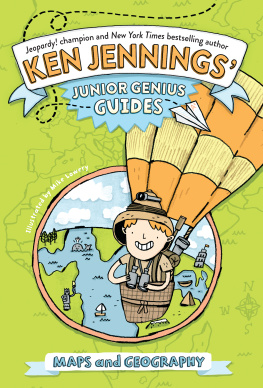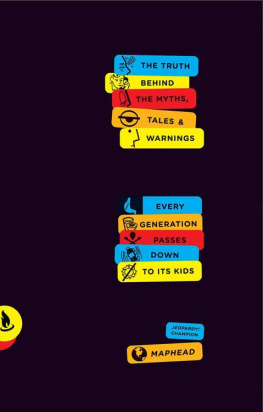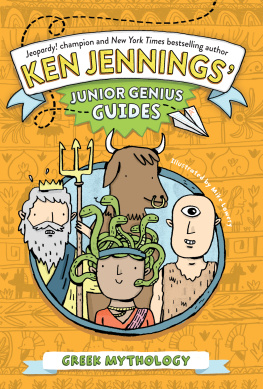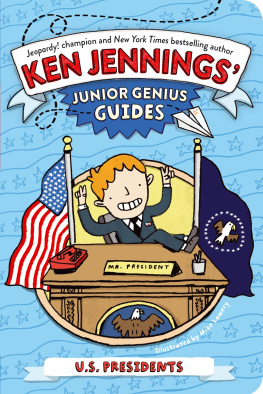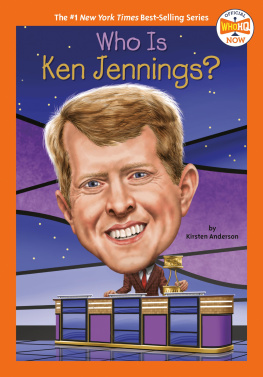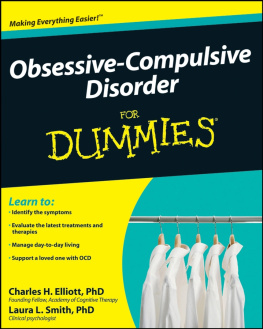Ken Jennings - Brainiac: Adventures in the Curious, Competitive, Compulsive World of Trivia Buffs
Here you can read online Ken Jennings - Brainiac: Adventures in the Curious, Competitive, Compulsive World of Trivia Buffs full text of the book (entire story) in english for free. Download pdf and epub, get meaning, cover and reviews about this ebook. year: 2006, publisher: Random House Publishing Group, genre: Detective and thriller. Description of the work, (preface) as well as reviews are available. Best literature library LitArk.com created for fans of good reading and offers a wide selection of genres:
Romance novel
Science fiction
Adventure
Detective
Science
History
Home and family
Prose
Art
Politics
Computer
Non-fiction
Religion
Business
Children
Humor
Choose a favorite category and find really read worthwhile books. Enjoy immersion in the world of imagination, feel the emotions of the characters or learn something new for yourself, make an fascinating discovery.
- Book:Brainiac: Adventures in the Curious, Competitive, Compulsive World of Trivia Buffs
- Author:
- Publisher:Random House Publishing Group
- Genre:
- Year:2006
- Rating:5 / 5
- Favourites:Add to favourites
- Your mark:
- 100
- 1
- 2
- 3
- 4
- 5
Brainiac: Adventures in the Curious, Competitive, Compulsive World of Trivia Buffs : summary, description and annotation
We offer to read an annotation, description, summary or preface (depends on what the author of the book "Brainiac: Adventures in the Curious, Competitive, Compulsive World of Trivia Buffs " wrote himself). If you haven't found the necessary information about the book — write in the comments, we will try to find it.
Brainiac: Adventures in the Curious, Competitive, Compulsive World of Trivia Buffs — read online for free the complete book (whole text) full work
Below is the text of the book, divided by pages. System saving the place of the last page read, allows you to conveniently read the book "Brainiac: Adventures in the Curious, Competitive, Compulsive World of Trivia Buffs " online for free, without having to search again every time where you left off. Put a bookmark, and you can go to the page where you finished reading at any time.
Font size:
Interval:
Bookmark:


C ONTENTS
Cover Page
Title Page
Dedication
Epigraph
Authors Note
What is A MBITION?
What is A UDITION?
What is E RUDITION?
What is A MMUNITION?
What is C OMPETITION?
What is I GNITION?
What is C OMPOSITION?
What is F RUITION?
What is T RANSITION?
What is C OGNITION?
What is J UXTAPOSITION?
What is R EPETITION?
What is T RADITION?
What is R ECOGNITION?
What is D EMOLITION?
What is R EDEFINITION?
Acknowledgments
Trivia Timeline
Notes
About the Author
Copyright
To Mindy
For all the usual reasons
And six unusual ones
What shall I compare it to, this fantastic thing I call my Mind? To a waste-paper basket, to a sieve choked with sediment, or to a barrel full of floating froth and refuse?
L OGAN P EARSALL S MITH , Trivia, 1917
A UTHORS N OTE
A book about trivia has, potentially, the same problem that rock criticism or a sex manual does: its never as much fun as the real thing.
With that in mind, Ive tried to sprinkle trivia questions throughout this book, so that the sufficiently nerdy reader can play along at home. A superscript number like this one5 in the text doesnt indicate an endnote but, rather, identifies trivia question number 5 in a particular chapter. Each chapter has ten trivia questions embedded within it (except for Chapter 7, on the art of writing trivia, which has more, and the final chapter, which is essentially an epilogue and doesnt have any). Answers to each set of questions appear at the end of each chapter.
Ive tried to make the trivia serve the book, rather than vice versa. As a result, the 170 trivia questions herein are not necessarily my 170 personal favorites, but rather they are the questions that filled a particular niche in the narrative. Trivia questions like What did Einstein, Darwin, Poe, H. G. Wells, and Queen Victoria have in common, matrimonially speaking?1 or What company released a February 2004 statement to customers in rebuttal to OutKasts hit song Hey Ya?2 or What two parts of the body are joined by the philtrum?3 might be aesthetically superior to some of the trivia to follow, but they didnt happen to fit the context of the chapters.
Since much of this book revolves around my 2004 appearance on the syndicated quiz show Jeopardy!, I thought it might be helpful to recap the rules of that game, to refresh the memories of readers who may not be regular viewers.
Jeopardy! is a straightforward game of questions and answers, in which three contestants try to beat one another to answering general-knowledge (but faintly academically oriented) trivia. The shows central gimmick is that the questions and answers are syntactically reversed. Instead of asking, Who was the only U.S. president to marry in the White House? and expecting an answer of Grover Cleveland, host Alex Trebek will offer a clue like The only U.S. president to marry in the White House, and expect the response in question form: Who is Grover Cleveland? Contestants who forget the annoying Who is? tic may have their responses ruled as incorrect.
The game consists of two rounds, each played on a game board consisting of a grid of thirty TV monitors. The six columns of the board represent six categories: Geography, Classic TV, 11-Letter Words, and so forth. Each column contains five clues, arranged from top to bottom in increasing order of difficulty. In the first round, the clues are worth from $200 to $1,000. In the second round, or Double Jeopardy, the dollar values double and range from $400 to $2,000 per correct answer. Contestants who buzz in but guess incorrectly are penalized the amount of the clue. The first contestant to buzz in with a correct answer is awarded the points, and selects the next clue of his choice.
Three clues in each gameone in the first round and two in the secondare preselected as Daily Doubles, though neither the players nor the home audience know where on the board they will be found. The contestant who happens to select each Daily Double faces that clue alone, and can wager any or all of her current score on whether or not she will answer it correctly.
The Jeopardy! endgame is dubbed Final Jeopardy. All three players participate, as long as they have finished the second round with a positive score. A clue category is revealed, and players can bet any or all of their winnings that they will know the correct answer to a single clue in that category, just as with the Daily Doubles. When the final clue is revealed, players have thirty seconds to write down their responses. The player who leaves Final Jeopardy with the highest score returns on the following show; the others go home with cash prizes.
Until recently, all winning contestants were retired after five games.
A NSWERS
1. Einstein, Darwin, Poe, H. G. Wells, and Queen Victoria all married their first cousins.
2. Polaroid, alarmed by OutKasts injunction to shake it like a Polaroid picture, issued a February 2004 statement to customers, warning them that if you shake it too vigorously, you could distort the image.
3. The philtrum is the groove between your nose and your mouth.
C HAPTER 1
What is A MBITION ?
Heres some trivia for you. The red rock country of southern Utah is red for the same reason that the planet Mars has a pinkish tinge when you see it in the night sky: both are loaded with iron oxide, a.k.a. ordinary household rust. The shadows of these red desert crags are lengthening toward our car as it pulls into a dusty gas station on the Utah-Arizona border. The air smells of diesel fumes and sagebrush when I open the passenger-side door. My friend Earl Cahill unfolds himself from the drivers seat, relieved weve made it to this, our last chance at gas for fifty miles.
Earl is my old college roommate, and though hes a remarkable six-foot-nine in height, hes one of those giants who hope that by holding their head and shoulders at just the right dejected angle, they may somehowif not disappear completelyat least give the appearance of being only six-foot-four or six-foot-five. He blinks into the setting sun through the shock of floppy brown hair hanging over his face, a face that bears the perpetually disappointed look of an English foxhound or a Cubs fan.
As I pump gas, we reenact the ritual of all road-trippers since the days of Jack Kerouac, and try to figure out how were going to divvy up the trips costs. Unlike our beatnik freeway forefathers, however, Earl and I are both computer programmers, and were driving down to Los Angeles not to hear jazz or harvest lettuce or watch the sun set over the Pacific, but to try to land spots on Jeopardy!, Americas most popular and most difficult quiz show. Appropriately, geekily, we are squabbling about the most elegant algorithm to calculate and divide up our expenses.
How about this? I offer. Theres two of us, so that vastly improves our chances that one of us will make it on the show, right? And as we know, that person is guaranteed at least a thousand dollars, even if he finishes in third place. So heres what we do: we split all expenses when we get back, but if one of us makes it onto the show, that person pays for the others share of gas and other expenses from this trip.
Earls brow furrows, suspicious hes being conned.
Its no-lose, I persist. If you get on the show, you pay for all expenses, but you still turn a big profit from your winnings. The one who doesnt get on loses nothing.
Deal, he finally agrees. We shake on it as we switch spots and climb back into the car. It is a no-lose scenario, but Im guessing that Ill end up being the beneficiary of my own plan. Earl, I figure, is exactly the type game shows look for. Besides being incredibly smart and, as he likes to put it, sideshow-freak tall, he has a booming baritone voice and an eccentric way of speakingan inside-joke-rich patois of computer-hacker lingo, Simpsons references, and, mysteriously, quotes from Merchant Ivory movies. Hes exactly the kind of larger-than-life personality Jeopardy! needsa lock to get on the show. I figure Ive just negotiated myself a free trip to L.A.
Font size:
Interval:
Bookmark:
Similar books «Brainiac: Adventures in the Curious, Competitive, Compulsive World of Trivia Buffs »
Look at similar books to Brainiac: Adventures in the Curious, Competitive, Compulsive World of Trivia Buffs . We have selected literature similar in name and meaning in the hope of providing readers with more options to find new, interesting, not yet read works.
Discussion, reviews of the book Brainiac: Adventures in the Curious, Competitive, Compulsive World of Trivia Buffs and just readers' own opinions. Leave your comments, write what you think about the work, its meaning or the main characters. Specify what exactly you liked and what you didn't like, and why you think so.

